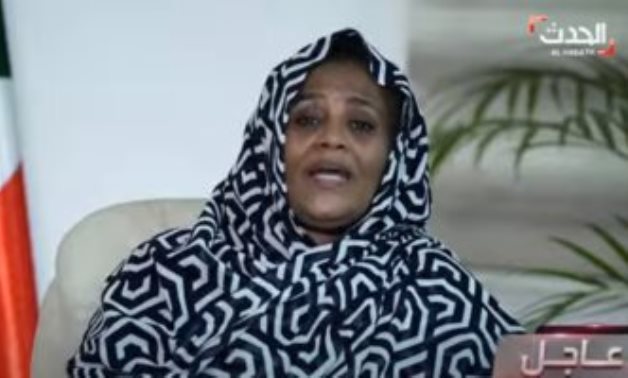
Sudanese Minister of Foreign Affairs Mariam al-Sadeq in an interview with Al Hadath TV channel on June 19, 2021. Press Photo
CAIRO – 20 June 2021: In an interview with Al Hadath TV channel Saturday, Sudanese Minister of Foreign Affairs Mariam al-Sadeq demanded imposing sanctions on states that abandon negotiations on the filling and operation of the Grand Ethiopian Renaissance Dam (GERD) referring to Ethiopia.
Sadeq added that the second filling of the dam will negatively affect the interests of Sudan and Egypt. She further pointed out that Ethiopia had refused to provide information on GERD causing tremendous losses to Sudan during the first filling in 2020.
The Sudanese minister underlined that a legal binding agreement on the filling and operation of the GERD will not cause harm to any country in the region. However, Ethiopia pursues procrastination and propagating disinformation.
As a consequence, Sudan communicated with the United Nations Security Council (UNSC) the intransigence of Ethiopia and its violation of good neighboring principle requesting mandating Ethiopia to abide by international law bases.
Egypt also reached out for the UNSC earlier in June affirms its rejection of any unilateral measures related to filling the GERD, calling for the need to reach a binding legal agreement on the rules for filling and operating the dam.
Egypt’s clear stance was voiced by Foreign Minister Sameh Shoukry in a phone call with Secretary-General António Guterres on June 10.
Shoukry called upon the United Nations and the UN Security Council to contribute to pushing Ethiopia to seriously engage in negotiations to reach the desired agreement.
The dispute among Egypt, Sudan, and Ethiopia dates back to May 2011 when Ethiopia started building the dam; Egypt voiced concern over its water share [55.5 billion cubic meters].
Three years later, a series of tripartite talks between the two countries along with Sudan began to reach an agreement, while Ethiopia continued the dam construction.
In 2015, the three countries signed the Declaration of Principles, per which the downstream countries should not be negatively affected by the construction of the dam.
In October 2019, Egypt blamed Addis Ababa for hindering a final agreement concerning a technical problem, calling for activating Article No. 10 of the Declaration of Principles, which stipulates that if the three countries could not find a solution to these disputes, they have to ask for mediation.
Washington had brokered tripartite negotiations among the three countries, in the presence of the President of the World Bank (WB) starting from November 6, 2019 until February 27 and 28, 2020.
During these rounds of talks, tangible outcomes were agreed on among the three parties concerning the rules and mechanism of operating the dam and the filling process of the reservoir during the drought and prolonged drought; however, an agreement was not sealed.
Constructions in the Grand Renaissance Dam started on April 2, 2011 at a cost of $4.8 billion. It was built by the Italian construction and engineering company Salini Impergilo. The Italian company is headquartered in Milan. The dam is located on the Blue Nile with a capacity of 74 billion cubic meters, and is expected to generate up to 6,000 megawatts of power.
The first filling was carried out in 2020 with 4.9 billion cubic meters. Currently, Ethiopia intends to do the second filling in July with at least 13.5 billion cubic meters.
Comments
Leave a Comment